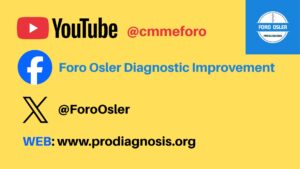A new diagnosis each month (7): when a disease is not easy to frame
A new diagnosis each month (7): when a disease is not easy to frame

Clinical case
A healthy eight-year old boy started with abdominal pain , bright red stools, and mild fever(37ºC). Initially, he was treated as a gastrointestinal infection with diet and fluids, but the abdominalpain persisted and the rectorrhagia increased. The fecal and blood cultures were negative for Salmonella, Campylobacter or Shigella .
The way a doctor thinks
Before a child with an acute problem a doctor will start thinking in a list of prevalent problems, in this case a gastrointestinal infection is the selection number one. At the same time, he or she will be thinking on “zebras” or common problems with an atypical presentation, Could be appendicitis?Could be an intussusception ? What was clear is that reaching a diagnosis in the shortest time was mandatory, because after seven days in the same clinical situation the boy was getting worse everyday.
Could we find a key data to resolve the problem? The new blood test came with a definitive key information : Hemoglobin value 6 g/dL.
With no fever, and negative cultures, it was clear that the probability of an infection has to be moved from the first place.
Anemia and rectal bleeding, the starting point
The combination of a child with an important anemia and rectal bleeding focused the reasoning in a short list of differentials: anal fissure, intussusception, Meckel´s diverticulum, Angiodysplasia (1) among others.
The physical examination ruled out some of the possibilities such as anal fissure or other more general entities associated with a coagulation problem.
The rectal bleeding persisted and after studying the Angio CT the surgeon decided to look for a Meckel´s diverticulum…and there it was.
Final Diagnosis
Meckel´s diverticulum
Comments
Meckel’s diverticulum (MD) is the most common congenital anomaly of the gastrointestinal (GI) tract, affecting about 2% of the population. The anomaly affects 2-4% of the general population and in the pediatric population the presence of rectal bleeding associated with this problem is more common in the segment of 2 to 5 years of age.
The diagnosis requires a high index of suspicion because is associated with common symptoms such as diarrhea. Angio CT and capsule endoscopy are important diagnostic tools (2).
The main risk for a doctor in relation with this diagnosis is the confirmation bias, that is, to keep the first diagnosis in mind (in this case a gastrointestinal infection) without paying attention to the new data obtained during the clinical evolution.
Bibliography
- Pediatric gastrointestinal bleeding: Perspectives from the
Italian Society of Pediatric Gastroenterology
Claudio Romano, Salvatore Oliva, Stefano Martellossi, Erasmo Miele, Serena Arrigo, Maria Giovanna Graziani,
Sabrina Cardile, Federica Gaiani, Gian Luigi de’Angelis, Filippo Torroni . World J Gastroenterol 2017 February 28; 23(8): 1328-1337. Access here
2)Wireless Capsule Endoscopy Detects Meckel’s Diverticulum in a child with Unexplained Intestinal Blood Loss.I. Xiniasa, A. Mavroudia, M. Fotoulakib, G. Tsikopoulosa, et al. Case Rep Gastroenterol 2012;6:650–659
DOI: 10.1159/000343593 Access here



